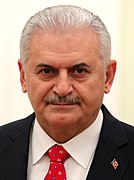| |||||||||||||||||||||||||
| Opinion polls | |||||||||||||||||||||||||
| Turnout | 84.51% ( | ||||||||||||||||||||||||
|---|---|---|---|---|---|---|---|---|---|---|---|---|---|---|---|---|---|---|---|---|---|---|---|---|---|
| |||||||||||||||||||||||||
 Neighbourhood results İmamoğlu: 40-50% 50-60% 60-70% 70-80% 80-90% | |||||||||||||||||||||||||
| |||||||||||||||||||||||||

The June 2019 Istanbul mayoral election was held on 23 June 2019.[1] It was a repeat of the March 2019 mayoral election, which was annulled by the Supreme Electoral Council (YSK) on 6 May 2019. The original election had resulted in a narrow 0.2% margin of victory for opposition candidate Ekrem İmamoğlu, causing the governing Justice and Development Party (AK Party) to successfully petition for a by-election.[2]
The Nation Alliance (formed of the Republican People's Party (CHP) and the Good Party) fielded their initial candidate Ekrem İmamoğlu, who ran a positive campaign under the slogan Her Şey Çok Güzel Olacak (Everything will be fine). The governing People's Alliance (formed by the AK Party and the Nationalist Movement Party) reselected their initially unsuccessful candidate Binali Yıldırım. The non-aligned Peoples' Democratic Party (HDP) did not stand their own candidate and announced their support for İmamoğlu. The election featured a televised debate between the two main candidates, for the first time in Turkey since 2002. Campaigning focused highly on rival accusations of misconduct during and after the initial March 2019 election, during which both sides alleged that they had been a victim of the other's antics.
The results showed a substantial swing in favour of İmamoğlu, who multiplied his initial 13,700-vote margin of victory 57-fold to win 54.2% of the vote against Yıldırım's 45.0%. The opposition's victory defied opinion polls, which predicted a much narrower victory, and was a record in the history of Istanbul local elections in terms of both popular vote and percentage share. İmamoğlu also won pluralities in 28 of Istanbul's 39 districts. Yıldırım, on the other hand, lost 11 districts he had won in March and saw a 4% decrease in his previous vote share, conceding defeat soon after indicative results became public.[3][4] The result was seen as a huge defeat to President Recep Tayyip Erdoğan, who had once said that if his party "lost Istanbul, we would lose Turkey."[5] Commentators viewed the result as a backlash against Erdoğan, the initial annulment of the March vote (which was largely seen as an anti-democratic manoeuvre), economic mismanagement and negative campaigning.[6][7][8][9] It was also seen as a backfire against the government's last-ditch attempt to involve the outlawed Kurdistan Workers' Party (PKK)'s imprisoned leader Abdullah Öcalan in the process, in an attempt to convince HDP voters to boycott the election.[10]
The opposition's landslide was characterised at the time as the "beginning of the end" for Erdoğan,[11][12][13] with international commentators calling the re-run a huge government miscalculation that led to a potential İmamoğlu candidacy in the next scheduled presidential election.[11][13] It was suggested that the scale of the government's defeat could provoke a Cabinet reshuffle and an early general election, though this did not come to pass.[14][15] İmamoğlu would end up not being chosen as the opposition's presidential candidate in 2023, and Erdoğan would end up being narrowly re-elected, defeating Kemal Kılıçdaroğlu.
- ^ "Son dakika... Seçimler 23 Haziran'da yenilenecek" [Last minute... Elections will be repeated on 23 June]. Haberturk (in Turkish). 6 May 2019. Archived from the original on 20 February 2020. Retrieved 6 May 2019.
- ^ Recep Özel (6 May 2019). "Son dakika... YSK, İstanbul Büyükşehir Belediye Başkanlığı seçiminin iptaline ve yenilenmesine karar verdi" [Last minute... YSK decided to annuel and repeat the Istanbul Metropolitan Municipality mayoral election]. Haberturk (in Turkish). Retrieved 6 May 2019.
- ^ "İstanbul seçim sonuçları belli oldu! Son dakika verilerine göre CHP 11 ilçeyi AKP'den aldı…". www.sozcu.com.tr.
- ^ "Binali Yıldırım, Ekrem İmamoğlu'nu tebrik etti". www.sozcu.com.tr.
- ^ "Erdoğan: 'İstanbul'da teklersek, Türkiye'de tökezleriz'". Tele1. 2 April 2019.
- ^ "Turkey's ruling party loses Istanbul election". BBC News. 23 June 2019.
- ^ Isil Sariyuce and Ivana Kottasová (23 June 2019). "Istanbul election rerun set to be won by opposition, in blow to Erdogan". CNN.
- ^ Gauthier-Villars, David (23 June 2019). "In Setback for Erdogan, Opposition Candidate Wins Istanbul Mayor Seat". Wall Street Journal.
- ^ "Son dakika… Financial Times'tan şok İstanbul seçimi yorumu". www.sozcu.com.tr.
- ^ "Erdogan Turns to Kurds to Win Istanbul Election". Voice of America.
- ^ a b Lowen, Mark (24 June 2019). "Can Erdogan bounce back from big Turkey defeat?". Retrieved 6 August 2019.
- ^ "The beginning of the end for Erdogan?". The National. 24 June 2019. Retrieved 6 August 2019.
- ^ a b "Could Imamoglu victory in Istanbul be 'beginning of the end' for Erdogan?". euronews. 24 June 2019. Retrieved 6 August 2019.
- ^ "Turkey's Erdogan suffers election blow, sparking hope for change". CNBC. 24 June 2019.
- ^ Gall, Carlotta (23 June 2019). "Turkey's President Suffers Stinging Defeat in Istanbul Election Redo". The New York Times. ISSN 0362-4331. Retrieved 6 August 2019.

